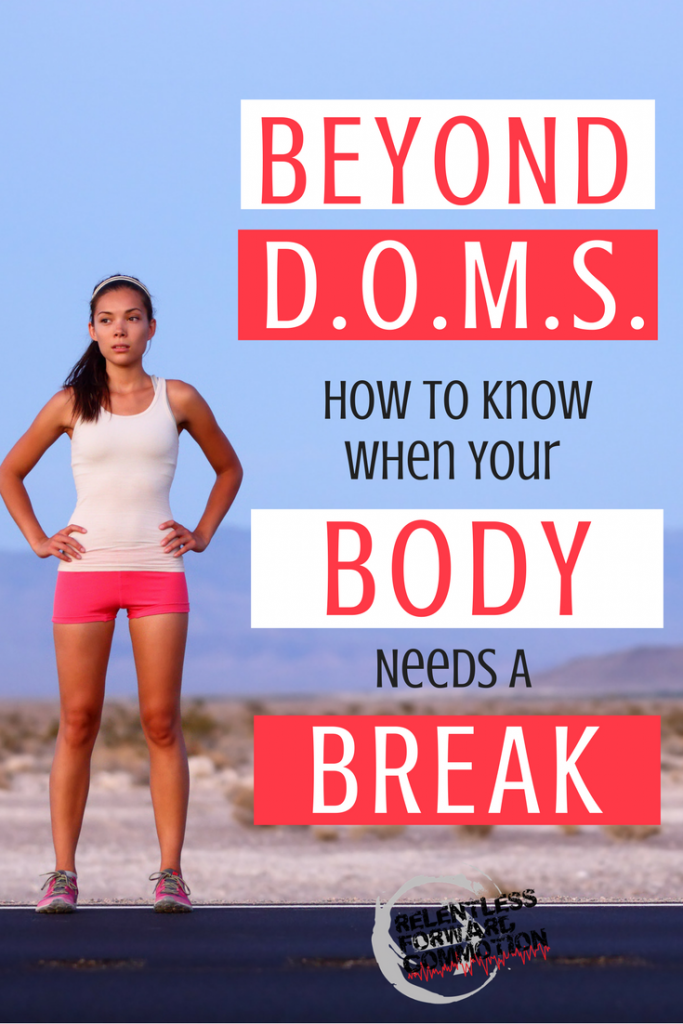Last Updated on December 19, 2017 by Heather Hart, ACSM EP, CSCS
After a race or a very difficult workout, how do you assess your readiness to start training again? If you are like most runners, you probably answered “when my legs stop hurting”.
Actually if you are like most runners, sore legs probably don’t stop you, but I digress.
There are a number of mathematical equations floating around the internet that can suggest how long you should wait before resuming training after a race. A common method suggested is resting one day per mile raced. I say: not every runner is created equally. Some athletes require even more recovery time, and some are able to properly recover much faster. As such, knowing if you are ready to resume more demanding workouts can be a bit of a guessing game. So how DO you know if you are ready to get back to a regular training schedule?

Let’s talk a little bit about what happens to your body after a long race or hard workout. First, and often most obvious, you damage your muscles on a microscopic, cellular level. This is essentially what causes the soreness you feel the next day (or days) after an event (often referred to as delayed onset muscle soreness, or DOMS.) But so much more than than muscle damage and repair is going on internally. Your body is working on overdrive to replenish stored energy (carbohydrates, proteins, fats) that were depleted during your race or workout. Your hormones are likely out of balance, due to natural physiological stress responses to the effort put forth during your race or workout. Your immune system is potentially compromised. Your resting heart rate is likely elevated. Essentially, your body is busting it’s proverbial butt to try and restore your body to what it was BEFORE the hard race or workout. And most of these symptoms are as blatantly obvious as sore muscles (as anyone who has tried to climb a staircase the morning after a marathon can tell you), so we have to really listen to our bodies.
Here’s a quick checklist to ask yourself before you dive back in to the training grind:
Does anything hurt?
Yes, we just mentioned discussing things that aren’t as obvious as sore muscles, but sometimes the obvious still needs to be pointed out. Does any part of your body hurt when running? Is there a twinge in your IT band that wasn’t there before the race? An ache in your shins that showed up just after the last hard workout? These are signs from your body that something is wrong, and needs time to heal. Respect your body: give it time to heal. Do not run through pain.
How are you sleeping?
If the answer is “not as well as I normally do” the cause might be fatigue from racing or overtraining. Remember those stress hormones we mentioned above? The inability to sleep might be related to a hormonal imbalance. And while it may seem like the kind of thing you can push through, a lack of or disrupted sleep can result in a lowered immune system, as well as limiting your body’s natural ability to heal itself.
When you sleep, your body releases human growth hormone (HGH). HGH is produced by the pituitary gland and released into the bloodstream. It is the main hormone responsible for the aforementioned recovery, rebuilding damaged tissue and helping develop stronger bones and muscles. It also helps convert fat to fuel and keeps our bones strong. If you don’t sleep enough, you don’t produce enough HGH. Not only that, but not getting enough sleep may stimulate the production of cortisol, a stress hormone that slows down recovery.
And more cortisol might equal poor sleep. See how this cycle could be detrimental?
Are you feeling stressed, depressed, anxious, or irritable, for no particular reason?
Have these feelings come out of the blue or for no other tangible, explainable reason? Are you snapping at your kids or partner, or tearing up over something as ridiculous as a dog food commercial on TV? Feeling overwhelmed or stressed, like you can’t seem to keep up with life? Of course, this could all be a reaction to a million different things, emotional health is indeed a tricky topic and sometimes hard to pinpoint. However, as an avid endurance athlete, when these feelings come up, it’s always helpful to take a look at your training or racing load, and see if you are possibly approaching burnout status.
Are you hitting your prescribed workouts, or are you suddenly struggling to get them done?
Last winter I ran 84 miles at Hallucination 24 hour race. At that point, it was my longest distance covered to date. It hurt, as running 84 miles almost always does, but I was surprised to discover that just a few days later, I physically felt as good as new. So naturally, I went right back to running. At the time, I was coaching a marathon training group, and I tried to hop in on their training sessions, as I had done for the previous three months. Except I quickly discovered that despite the fact that the group’s pace was well within my ability…I was struggling. My heart rate was elevated higher than normal, and I was struggling to maintain paces that just a few weeks earlier were considered a warm up for me. My body had not recovered from the race.
Periods: let’s talk about them.
Ladies, if you’ve missed more than one period while training, you may be suffering from exercise induced amenorrhea. Amenorrhea is the term for an absence of menstruation: or, more than one missed period. In the endurance athlete world, exercise induced amenorrhea is often a warning sign that the body is under too much stress and has too little energy stores to support healthy functioning. And while not having to deal with a monthly menstrual cycle sounds like a blessing, it can actually come with a slew of negative side effects, including (but not limited to): infertility, reduced bone density, osteoporosis, atrophy of the vagina and breast, and even increased risk of heart attack (source).
Elevated heart rate.
Have you noticed your resting heart rate, especially first thing in the morning is higher than normal? If so, you might be overtraining. Just like everything else in your body, your heart reacts to the increased stress and stress hormones that accompany overtraining. It’s normal for your resting heart rate to be elevated for shorter durations of time after a hard race or workout. But if you notice that your RHR remains elevated for multiple days or even weeks? You might be overtraining.
Other things to note:
Even more clues that you might be overtraining include (but aren’t limited to):
- Loss of appetite
- Loss of sex drive
- Loss of motivation
- Large and sudden weight fluctuations
- Longer recovery periods needed after workouts
As you can see, while our bodies may not have a flashing “low battery” alert like nearly everything else in our technology driven world, our bodies do speak to us in many other ways…we simply need to listen. So what do you do if you think you aren’t yet recovered from a race or hard workout, or might be suffering from overtraining? Rest. Cutback on training volume. Reevaluate your current training plan. Consult with a coach, or even a physician, if needed.
Most of all, remember that running is a lifetime sport. Running your body into the ground today may feel worth it for an immediate endorphin fix, or as a means to reaching a short term goal. But these are temporary actions that may have long term negative side effects. Is it worth a potential 6-8 week injury, illness, or suffering something like chronic fatigue syndrome?
No. The answer is no.
You’ve only got one body, treat it well and it will continue to carry you for thousands of miles and many years to come!
Heather Hart is an ACSM certified Exercise Physiologist, NSCA Certified Strength and Conditioning Specialist (CSCS), UESCA certified Ultrarunning Coach, RRCA certified Running Coach, co-founder of Hart Strength and Endurance Coaching, and creator of this site, Relentless Forward Commotion. She is a mom of two teen boys, and has been running and racing distances of 5K to 100+ miles for over a decade. Heather has been writing and encouraging others to find a love for fitness and movement since 2009.

Kyle Smith
Perfect. Just the read I needed. Struggling to recover from my 1st 50 miler at end of Oct